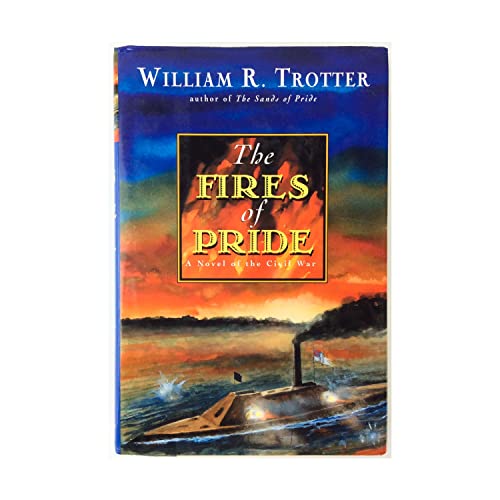Items related to The Fires of Pride: A Novel

"synopsis" may belong to another edition of this title.
Neither book tells a well-known story. Carter explores the battle of Stones River, fought on Dec. 31, 1862, and Jan. 2, 1863, a short distance from Nashville. Bloodier but less famous than Shiloh, Stones River pitted the Union Army of the Cumberland under William S. Rosecrans against Braxton Bragg's Army of Tennessee. In addition to the army commanders, Carter weaves into his text several generals on each side, as well as Ambrose Bierce, a junior officer, and a handful of other subalterns and common soldiers. Trotter employs a wider narrative lens to chronicle the war in North Carolina from mid-1863 through the end of the conflict (his novel The Sands of Pride covered the first half of the war). His cast also includes Braxton Bragg, other historical figures such as the daring Union naval officer William B. Cushing, and more fictional characters than are present in Carter's book.
Readers enamored of military action are most likely to find Bright Starry Banner to their taste. As in The Killer Angels, women and African Americans play virtually no role in Carter's story, which hews to the bloody work of white soldiers slaughtering each other. Carter delivers an intelligible narrative of Stones River, avoiding nonmilitary digressions and alternating between Union and Confederate perspectives to describe the tactical ebb and flow. He spends most of his time with generals and their staffs, officers who little resemble the upright Victorians of Civil War memoirs. On the first day of battle, for example, Philip H. Sheridan, who leads a Union infantry division, says he "will not be driven by a bunch of goat-screwing, scratch-ass rednecks. That is for goddamn sure."
Carter's treatment of generals -- especially the Confederates -- seems a bit strained in many ways. Lt. Gen. William J. Hardee, a punctilious West Pointer, is "Bill Hardee"; Maj. Gen. Patrick R. Cleburne, an Irish-born veteran of the British army, is "Irish Pat Cleburne." Confederate corps commander and former Episcopal bishop Leonidas Polk, in the midst of battle, recalls youthful wet dreams, and Braxton Bragg, who suffered from chronic dysentery, "breaks wind tremendously, gasps with the effort, presses hard again, and lets loose a second thunderous delivery."
Carter similarly tries too hard in sketching individual soldiers in combat. One sequence describes opposing color-bearers who grapple as "Miniť balls hiss about them. . . . Much of the fire is unaimed and it is impossible to say whether Rebel or Yankee bullets -- or both -- strike the sergeants. They go down on their knees, desperately holding up their respective banners. Their grappling gives way to an embrace as they sway like drunken men. Then they fall in each other's arms, the flags draping about them in bloody, garish folds."
Readers seeking more than a blow-by-blow account of battle will prefer Trotter's book. Unlike the North Carolina of Cold Mountain, Trotter's includes significant black characters whose experiences illuminate the transition from slavery to freedom. Overall, Trotter's characters, both historical and fictional, are far more fully realized than Carter's. The Fires of Pride probes how the war blurred distinctions between the civilian and military spheres and altered the Confederate social and economic landscape. It brings key characters together in detailed renderings of the construction and destruction of a mighty Confederate ironclad ram named the Hatteras (based on the real Confederate vessel Albemarle, which was sunk in a daring exploit by William B. Cushing) and of the fighting at Fort Fisher, an earthwork guarding the port of Wilmington.
Trotter displays a surer hand than Carter in treating combat. During a Union assault at Fort Fisher, Cushing watches as artillery fire cuts down a comrade: "a dark blur streaks across the dunes, and the canister balls simply erase Ben Porter in a gush of wet sand. After the debris cloud settles, all Cushing can see that's identifiable is one boot, a severed hand, and the lieutenant's sword, its point driven into the sand, slowly oscillating back and forth, a grave marker of steel." The two novels share several attributes. Each has an obligatory scene that underscores similarities between the two sides' soldiers. Each deploys graphic language, presumably to help readers connect with Civil War-era Americans. And each fails utterly to present believable sexual encounters, as when Trotter describes a couple interrupted in bed as battle looms: "And remember where we were when we left off!" admonishes the man as he leaves. " 'I will,' she says, rising naked from the bed. . . . 'I will remember it forever.' "
Neither of these books will be remembered forever, though each should find an audience. The great American Civil War novel, a most elusive literary phenomenon, remains to be written.
Copyright 2004, The Washington Post Co. All Rights Reserved.
Copyright © Reed Business Information, a division of Reed Elsevier Inc. All rights reserved.
"About this title" may belong to another edition of this title.
- PublisherCarroll & Graf
- Publication date2003
- ISBN 10 0786712236
- ISBN 13 9780786712236
- BindingHardcover
- Number of pages560
- Rating
Buy New
Learn more about this copy
Shipping:
US$ 3.00
Within U.S.A.
Top Search Results from the AbeBooks Marketplace
The Fires of Pride: A Novel
Book Description Hardcover. Condition: new. Brand New Copy. Seller Inventory # BBB_new0786712236
The Fires of Pride: A Novel
Book Description Hardcover. Condition: new. Buy for Great customer experience. Seller Inventory # GoldenDragon0786712236
The Fires of Pride: A Novel
Book Description Hardcover. Condition: new. New Copy. Customer Service Guaranteed. Seller Inventory # think0786712236
The Fires of Pride: A Novel
Book Description Condition: new. Seller Inventory # FrontCover0786712236
The Fires of Pride: A Novel
Book Description Hardcover. Condition: New. Brand New!. Seller Inventory # VIB0786712236
THE FIRES OF PRIDE: A NOVEL
Book Description Condition: New. New. In shrink wrap. Looks like an interesting title! 1.95. Seller Inventory # Q-0786712236

